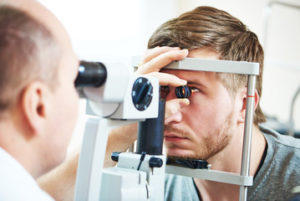The Comprehensive Eye Exam: It’s all about the Pupils!
 Every patient who visits our Reading or Melrose office receives an exam that is tailored to his or her needs. Sometimes, a basic exam is sufficient, allowing us to observe the pupils in relation to light. In some instances, the best approach to care is to look beyond the surface. In order to do efficiently do this, it is necessary to dilate the eyes.
Every patient who visits our Reading or Melrose office receives an exam that is tailored to his or her needs. Sometimes, a basic exam is sufficient, allowing us to observe the pupils in relation to light. In some instances, the best approach to care is to look beyond the surface. In order to do efficiently do this, it is necessary to dilate the eyes.
What is Dilation, and Why is it Necessary?
To dilate the eyes means to open up the pupils. If you look into a mirror in bright light, you will see that your pupils become very small. Turn off the light momentarily, and observe your pupils as soon as you turn the light back on, and you will see how enlarged they become. The reason why pupils enlarge, or dilate, is to let more light in so you can see better. During the eye exam, the dilated pupil lets us observe the inner workings of each eye to a much larger extent.
There is good reason to have your eyes dilated for a full eye exam. A number of the conditions that could be quite concerning as you age are best detected in this manner. These include glaucoma, diabetic retinopathy, and macular degeneration.
Glaucoma
Glaucoma is a condition in which the fibers of the optic nerve are involved. These fibers extend from the central nervous system into the eyes. When the eyes are dilated, your eye doctor can visualize the point at which these fibers enter the eye. Cupping of the optic nerve fibers could indicate the onset of glaucoma.
Diabetic retinopathy
This diabetic condition develops when the amount of sugar in the blood impedes circulation though the tiny blood vessels in the eyes. Usually, both eyes are affected; and , usually, there are very limited early signs of abnormality. As the condition progresses, symptoms such as floaters, blurred vision, and vision loss could occur. When we dilate the eyes, we can assess the macula in the retina for swelling or blood leakage, and can also evaluate the structural integrity of blood vessels.
Macular degeneration
It is possible to assess for the risk or early signs of age-related macular degeneration by dilating the eyes. If we notice swelling or clumps of pigment around the retina, we can schedule further testing through which an accurate diagnosis can be made.
For your eye exam, call our main office at (781) 942-9876.



Leave a Reply
Want to join the discussion?Feel free to contribute!